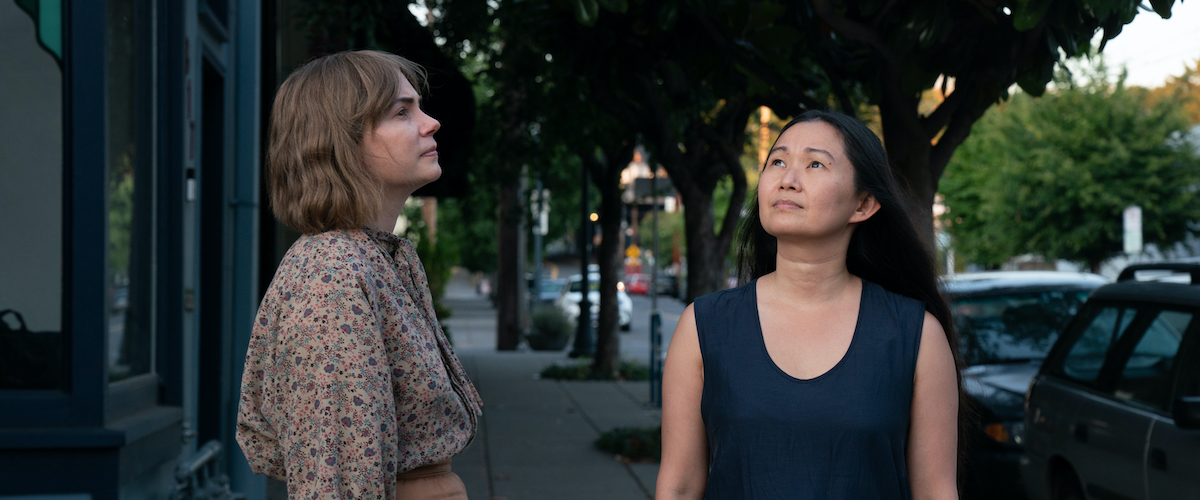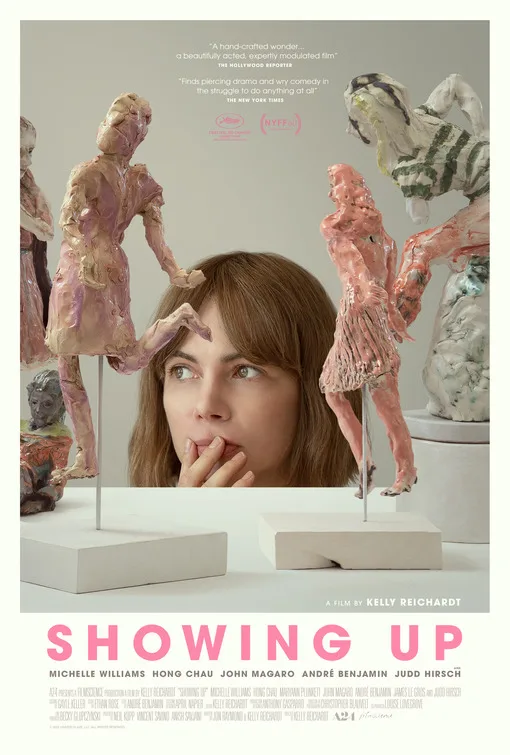“She’s got it figured out.” Lizzy (Michelle Williams), a sculptor living and working in Portland, says about Jo (Hong Chau), her landlord, fellow artist and seemingly only friend. It’s not a smooth relationship. Jo, who lives in the unit next door to Lizzy, is an inattentive landlord. Lizzy has no hot water, Jo keeps saying she’ll get to it. Lizzy looks on at Jo’s hardiness and resilience in wonder and something like envy, although the envy is more a nagging itch than Iago’s overwhelming monomania. This relationship is the center of Kelly Reichardt‘s gentle and sometimes funny “Showing Up,” although Lizzy is surrounded by people who seemingly care about her. Lizzy is stuck. She can’t feel the goodness of her life. Jo has everything she doesn’t. Jo’s got “it” figured out.
But what is “it”? Jo’s art? Her casual ability to self-promote? Or is “it” just life in general? Lizzy is so undeveloped she actually thinks other humans have “it” figured out, rather than understanding all humans have problems and we’re all built differently. Everyone moves at their own pace. Marlo Thomas told a story once about how she struggled to make a career for herself in the shadow of her famous father and her peers, who all seemed to be doing better than she was. Her father saw the struggle and said, “You’ve got to run your own race, baby.” Lizzy can’t run her own race.
There’s a certain kind of competition among small-town “local” artists which has a different flavor from the jostling for status among artists in big cities and big-name artists with national or international reputations. In smaller circles, there’s an assumption that all local artists are part of one big family, support of one another is required, everyone goes to everyone else’s gallery shows, and nobody should absent themselves from the group. Lizzy is an outsider, but it’s self-imposed, and she doesn’t even realize it. She works at her alma mater, the Oregon College of Art and Craft (established in 1907, which closed its doors in 2019, the death of a beloved local institution). She’s an administrative assistant for her mother (Maryann Plunkett), which makes asking for days off awkward. A visiting artist thanks her for creating a beautiful flier for an upcoming show and is surprised to learn Lizzy herself has an upcoming show. Lizzy doesn’t “present” as an artist at all.
Kelly Reichardt, one of the most exciting filmmakers working today, nails this insular vibe and the unspoken supersonic buzz of competition and envy. This is a reasonably story-heavy film for Reichardt, who primarily specializes in moody pieces about wanderers and seekers (“Old Joy,” “Wendy and Lucy,” “Meek's Cutoff,” “Certain Women“). Her last film, the celebrated “First Cow,” also featured more of a linear “story” than her others, and “Showing Up” continues in that direction, although on a smaller and quieter scale. The scenes of students working at the college, sculpting, working at looms, or dancing randomly in the grassy lawn, have a Utopian feel, a Utopia Lizzy is barred from.
Lizzy’s father (Judd Hirsch) was also a sculptor and he takes an interest in his daughter’s work. However, he’s wrapped up in his own life, with two perpetual visitors, played by Amanda Plummer and Matt Molloy, grifter hippies who never settled down. This duo might have been the lively center of another Reichardt film. Lizzy is irritated by them and feels her father is being taken advantage of (and maybe jealous of the attention they soak up from her dad). She worries about her brother (John Magaro), a more stereotypical genius artist, a recluse whose unpredictable behavior is alarming and possibly dangerous. Lizzy also gets caught up in this whole drama with a wounded pigeon foisted on her by Jo. The pigeon takes up a lot of brain space, and Lizzy finds it hard to work with it around. The pigeon is a literary device (the script is by frequent collaborator Jon Raymond of “Wendy and Lucy,” “Meek’s Cutoff,” and “First Cow”).
Williams (another frequent Reichardt collaborator) plays a downtrodden meek person, her slope-shouldered shuffling walk evoking disappointment, resentment, and invisibility. Hong Chau emanates energy and confidence, throwing parties for herself, building a tire swing, and working on her gigantic colored-yarn creations. (Michelle Segre created Jo’s installations, and Lizzy’s small sculptures of women in various stages of wild movement, either joyful or anguished, were created by Cynthia Lahti). The Portland “scene” is totally believable: the storefront galleries, the cheap wine, the cheese squares, the artists on top of one another, totally aware of each other’s work, in each others’ business, maybe ambivalent, but maybe not. Jo shows up at Lizzy’s small gallery show. Lizzy doesn’t go to Jo’s. This is a no-no. The great André Lauren Benjamin (aka André 3000) plays the kiln operator at the college, and he is another “can do” personality, helpful and supportive to the artists who come to him. Lizzy can’t meet him on that level. She’s put-upon, maybe even embarrassed about her art. It’s not important enough.
This may be stating the obvious, but the title has a dual meaning and expresses the tension in this small community, or, at least, the tension Lizzy feels. “Showing Up” can mean showing up for others, supporting, attending Jo’s show, and being happy for her success. “Showing Up” also means feeling like others are ahead of you, doing way better than you, and obliterating your own accomplishments. If you feel “shown up” by your peers, it’s impossible to “show up” for others. There’s something a little too neat about the structure of “Showing Up,” and the pigeon wears its symbolism on its broken wings. But the piercing specificity of Reichardt’s vision, and her insights into the dynamics of an art scene like the one in Portland, are spot on.
Now playing in theaters.




















